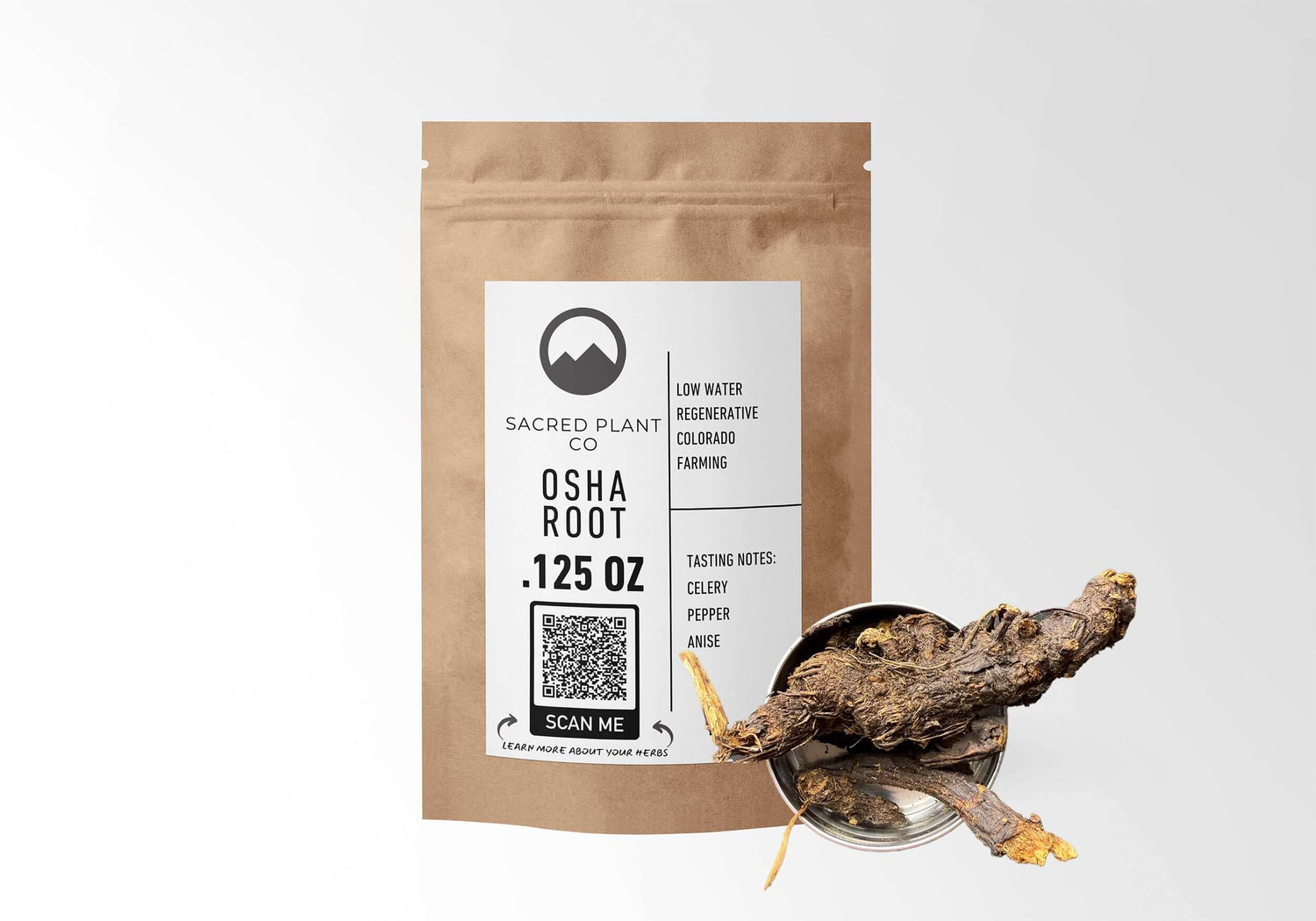Two Powerful Herbs, One Common Goal: Clearer Breathing

As respiratory health becomes more important than ever, many people are exploring time-tested herbal allies to support clearer lungs and stronger immunity. Thyme and Osha Root are two standout herbs that have long been used in traditional herbalism to help open airways, soothe coughs, and promote resilience during seasonal shifts. But how do you choose between them? In this guide, we explore the cultural history, herbal benefits, and best use cases for each—so you can breathe easy knowing you've picked the right plant ally for your wellness journey.
A Tale of Two Remedies: Understanding the Unique Power of Each Herb
Thyme is a widely known kitchen herb, but its uses go far beyond flavoring food. This fragrant plant has been cherished for centuries in Mediterranean and European herbal medicine for its potent respiratory support. It’s known to act as an expectorant, helping to clear mucus from the lungs while offering antibacterial and antiviral properties that make it especially useful during cold and flu season. Thyme’s earthy, warming nature makes it a reliable remedy for lingering coughs, sore throats, and congestion.
In contrast, Osha Root is a revered herb of the Rocky Mountains and Indigenous North American traditions. Nicknamed "Bear Root," it was traditionally used to support the lungs during harsh winters, especially at high altitudes. Osha has a warming, pungent profile that promotes deeper breathing, supports bronchial dilation, and helps open constricted airways. Many herbalists turn to Osha for its strong immune-supporting qualities, especially when the body needs a powerful ally to fight off respiratory pathogens.
Quick Comparison Chart: Thyme vs. Osha Root
| Feature | Thyme | Osha Root |
|---|---|---|
| Form | Fresh or dried leaves; teas, tinctures, essential oils | Dried root; teas, tinctures, capsules |
| Tradition | Mediterranean cuisine and traditional medicine | Native American and Hispanic traditional medicine |
| Best Known For | Antimicrobial properties, soothing coughs, supporting respiratory function | Immune support, aiding respiratory conditions, alleviating coughs and colds |
| Taste Profile | Earthy, slightly minty, and aromatic | Celery, Pepper, Anise |
| Best Use Time | During respiratory discomfort or as a daily tonic for immune support | At the onset of respiratory symptoms or during seasonal changes |
| Scientific Support | Contains compounds like thymol with antimicrobial and anti-inflammatory effects | Traditionally used for respiratory ailments; limited scientific studies available |
Ancient Roots with Modern Benefits
Both Thyme and Osha Root carry with them a deep cultural history. Thyme was used by the ancient Greeks as a symbol of courage and purification. They burned it in temples and used it in baths for its aromatic and cleansing qualities. In medieval Europe, it was also placed under pillows to ward off nightmares and encourage restful sleep.
Osha Root, meanwhile, holds sacred significance for many Indigenous tribes across the American Southwest and Rocky Mountain region. It was traditionally chewed or brewed into teas to ward off colds and coughs. In ceremonial contexts, it was often burned or carried for spiritual protection. These cultural threads still influence how Osha is viewed today—as a deeply grounding and protective botanical.
How Science Supports These Herbal Heroes

Modern herbal research continues to validate what traditional wisdom has long known. Thyme contains thymol, a powerful compound with proven antimicrobial and antioxidant effects. Studies suggest that thymol can help reduce inflammation in the respiratory tract and inhibit the growth of certain pathogens responsible for upper respiratory infections. This makes Thyme particularly valuable for tackling bronchial congestion, sinus infections, and coughs.
Osha Root is less studied in clinical trials but remains a staple among herbal practitioners. It contains essential oils, ferulic acid, and other compounds believed to support oxygen uptake and reduce inflammation in the lungs. Though more research is needed, anecdotal evidence and traditional use make it a go-to herb for acute respiratory distress, especially when combined with other immune-supportive herbs.
Which Herb Is Right for You?
If you're looking for an accessible, gentle herb with broad-spectrum support for common respiratory ailments, Thyme is a great place to start. It's ideal for everyday use, especially during cold and flu season, and can be incorporated easily into your diet or steeped into a warming tea.
On the other hand, if you're dealing with more intense respiratory symptoms—such as deep chest congestion, labored breathing, or frequent exposure to environmental irritants—Osha Root may offer the stronger support you need. Its unique ability to open airways and promote lung resilience makes it particularly helpful for those recovering from illness or navigating seasonal transitions.
Thyme: The Aromatic Respiratory Supporter
Traditional Use
Thyme has been a staple in Mediterranean cuisine and traditional medicine for centuries. Beyond its culinary applications, it has been used to:
-
Alleviate respiratory issues: Traditionally employed to soothe coughs and support lung health.
-
Combat infections: Valued for its natural antimicrobial properties.
-
Support digestion: Used to ease digestive discomfort and promote gastrointestinal health.
Modern Science
Contemporary research supports several of these traditional uses:
-
Antimicrobial effects: Thyme contains thymol, a compound known for its antibacterial and antifungal properties, which may help in managing respiratory infections.
-
Anti-inflammatory properties: Studies suggest that thyme may reduce inflammation, potentially aiding conditions like bronchitis and sore throats.
-
Cough relief: Some research indicates that thyme, especially when combined with other herbs, can help reduce the severity and duration of coughs.
Note: While promising, more extensive human studies are needed to fully substantiate these benefits.
Osha Root: The Mountain Respiratory Ally
Traditional Use
Osha Root, often referred to as "Bear Root," has a long history of use among Native American and Hispanic communities. Traditionally, it has been employed to:
-
Support respiratory health: Used to alleviate symptoms of coughs, colds, bronchitis, and other lung-related issues.
-
Boost the immune system: Believed to enhance the body's natural defenses, especially during seasonal changes.
-
Aid digestion: Occasionally utilized to address indigestion and gastrointestinal discomfort.
Modern Science
While scientific research on Osha Root is limited, some studies and anecdotal evidence suggest:
-
Respiratory benefits: Osha Root is thought to act as a bronchodilator, helping to open airways and ease breathing difficulties.
-
Immune support: Traditionally considered an immune booster, though more research is needed to confirm this effect.
-
Antimicrobial properties: Some compounds in Osha Root may possess antibacterial and antiviral activities, potentially aiding in fighting infections.
Important: Due to limited scientific studies, it's advisable to consult with a healthcare professional before using Osha Root, especially if you have underlying health conditions or are taking other medications.
Which Herb Is Right for You?
Choose Thyme if you:
-
Seek a readily available, culinary herb that doubles as a medicinal remedy.
-
Prefer an herb with antimicrobial properties to support respiratory health.
-
Are looking for a gentle, daily tonic to maintain overall wellness.
Choose Osha Root if you:
-
Need support during acute respiratory conditions, such as colds or bronchitis.
-
Are interested in traditional remedies with a history of use in respiratory health.
-
Understand the importance of consulting with a healthcare provider due to limited scientific research.
Can They Be Used Together?
Absolutely. In fact, Thyme and Osha Root complement each other beautifully. While Thyme works gently to clear congestion and soothe inflammation, Osha adds a deeper level of support, encouraging open airways and enhancing the immune system’s response. A tea blend or tincture combo featuring both herbs can offer a potent, well-rounded approach to respiratory wellness.
Lung-Support Herbal Tea

Here’s a simple herbal tea recipe that combines the power of both herbs:
Ingredients:
-
1 tsp dried Thyme
-
1/2 tsp dried Osha Root (use sparingly due to its potency)
-
1/2 tsp Licorice Root (optional, for added soothing and sweetness)
-
8 oz hot water
Instructions:
-
Combine the herbs in a tea infuser or muslin bag.
-
Pour 8 oz boiling water over the herbs.
-
Steep for 10–12 minutes.
-
Remove herbs and sip slowly. Enjoy up to two cups daily during times of respiratory stress.
Additional Tips for Respiratory Wellness
-
Pair your herbal tea with steam inhalation using Thyme essential oil to further open the airways.
-
Stay hydrated to help thin mucus and support overall lung function.
-
Incorporate breathwork or light movement (like walking or stretching) to stimulate oxygen flow and recovery.
Explore More Herbal Respiratory Resources
If you’d like to go deeper, here are a few resources from the Sacred Plant Co blog to explore:
Bear Root: Powerful Herbal Benefits and Uses
Explore the deep-rooted legacy of Osha Root (Bear Root), a powerful herbal ally cherished for respiratory wellness, immune support, and high-altitude vitality. This article dives into its traditional uses, modern applications, and how it continues to support wellness today.
How to Make Osha Root Tea - A Healing Brew from Sacred Plant Co
Learn how to prepare a soothing, immune-supportive cup of Osha Root Tea with this step-by-step guide. Discover the healing properties, traditional significance, and wellness benefits of this revered herb in every warm, comforting sip.
Soothe Your Cough Naturally: Effective Herbs for Respiratory Relief and Wellness
Explore effective, time-tested herbs that naturally soothe coughs and support respiratory wellness. This guide highlights powerful botanical allies to help you breathe easier and feel better, naturally.
Breathe Easy with Herbal Wisdom

Whether you reach for Thyme’s gentle clearing or Osha Root’s powerful support, both of these herbs offer incredible potential for clearer breathing and resilient health. You don’t have to choose just one—they work beautifully together to form a natural, effective respiratory support system. So the next time your lungs feel tight, dry, or congested, let these time-honored herbs be your first line of support.
FAQ: Thyme vs. Osha Root
What’s the quick difference between Thyme and Osha for respiratory support?
Thyme is a familiar culinary herb often chosen for gentle, everyday support (e.g., steeps/teas). Osha Root is a pungent, warming mountain root that appears in historical accounts as a short-term seasonal ally. Your choice depends on your goals, tolerance, and professional guidance.
Can they be used together?
Some people combine them for complementary support—Thyme for soothing daily steeps; Osha in smaller, short-term amounts. If you’re unsure about suitability or dosing, speak with a healthcare professional.
How do I brew a simple Thyme tea?
Use about 1 tsp dried Thyme per 8 oz hot water. Steep 8–12 minutes, then strain. Many add honey and lemon.
How do I prepare Osha as a simple tea (decoction style)?
Simmer a small piece of dried Osha Root (use sparingly) in 8–10 oz water for 15–20 minutes. Strain carefully. Start low to assess comfort and taste.
Who should avoid or use extra caution?
Those who are pregnant or nursing, individuals with known plant allergies (e.g., Apiaceae for Osha), people managing medical conditions, or anyone on prescription medications should seek personalized guidance before use.
How long should I use these herbs?
Many people reserve Osha for short-term, seasonal use. Thyme may be used more casually in culinary and tea contexts. Take breaks and observe your individual response.
Any medication interactions?
Interactions are possible. Because everyone’s health context is unique, consult a clinician or pharmacist before adding new herbs to your routine.
How should I store dried herbs and roots?
Keep them in airtight containers away from heat, light, and moisture. Label with the date and rotate stock. Many dried herbs keep best quality for about a year when stored well.
Is Osha endangered? What about sourcing?
Osha grows slowly and has a limited range. Choose products from reputable suppliers who prioritize ethical sourcing and quality practices.






